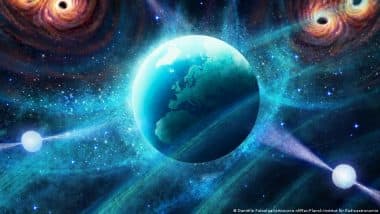Astronomers have made a discovery that confirms the existence of gravitational waves, which sound like the hum at a large gathering. These ripples in space-time were proposed by Albert Einstein over a century go.An international group of scientists has made a groundbreaking discovery that confirms the existence of gravitational waves first envisioned by Albert Einstein.
The report, published on Thursday, says that astrophysicists were able to "hear" low-frequency gravitational waves — changes in the fabric of the universe that are created by huge objects moving around and colliding in space.
"It's really the first time that we have evidence of just this large-scale motion of everything in the universe," said Maura McLaughlin, co-director of NANOGrav, the research collaboration that published the results in The Astrophysical Journal Letters.
These gravitational waves, detected at low frequencies, create a cosmic background hum that permeates the universe. The research indicates that space is filled with these waves, which oscillate over extended periods, primarily originating from pairs of supermassive black holes spiraling and merging together.
Confirming Einstein's theory
Einstein initially proposed the existence of gravitational waves, or ripples in space-time, in 1916 as an extension of his revolutionary theory of general relativity. The famous theory described gravity as the distortion of space and time caused by matter.
However, it wasn't until 2016 that scientists successfully detected these waves directly, having relied on indirect evidence since the 1970s.
The recent research heavily relied on pulsars, which are the highly dense remnants of exploded stars spinning at extraordinary speeds.
"Gravitational waves are generated by astronomically dense objects in our universe, typically in orbital motion around each other. As these waves travel through space, they physically stretch and compress the fabric of space-time itself," Jeff Hazboun, an astrophysicist from Oregon State University and lead author of one of the papers published in the Astrophysical Journal Letters told the Reuters news agency.
The data for the latest report was collected by North American Nanohertz Observatory for Gravitational Waves (NANOGrav) Physics Frontiers Center, comprising over 190 scientists from the United States and Canada, in the period of 15 years.
Gravitational waves sound like hum
Scientists liken the universe's gravitational wave background to the hum of a large gathering, where individual voices cannot be distinguished.
This discovery comes seven years after the initial detection of gravitational waves generated by two distant black holes, dense objects with gravity so intense that even light cannot escape them.
The motion of black holes and other massive objects can produce these gravitational waves. The previous research was conducted using the Laser Interferometer Gravitational-Wave Observatory (LIGO).
Hazboun said, "We now have compelling evidence of gravitational wave hum in a new frequency range. These frequencies are significantly smaller, around 10-12 orders of magnitude, compared to those detected by LIGO, and they have wavelengths spanning light years."
He further added, "The most straightforward explanation for these gravitational waves involves a collection of supermassive black hole pairs orbiting each other in our cosmic neighborhood. However, alternative explanations could involve intriguing new physics related to the early stages of the universe, near the Big Bang, approximately 13.8 billion years ago."
tg/dj (AFP, AP, Reuters)
(The above story first appeared on LatestLY on Jun 29, 2023 11:40 AM IST. For more news and updates on politics, world, sports, entertainment and lifestyle, log on to our website latestly.com).













 Quickly
Quickly





















